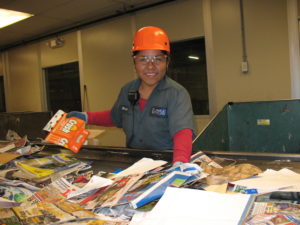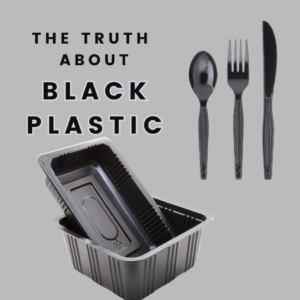One of the most common questions from Eureka tour guests – and one of the most common items looked up on our What Can I Recycle Tool is about peanut butter…
Have you ever tried to remove all of the peanut butter from the jar before putting it in the recycling cart? If you have, you know it is not an easy task. If, like most of us, you scrap it out a little and think, “Good enough,” you’re not that far off. When it comes to recycling used food containers, Material Recovery Facilities (MRFs) like Eureka prefer them to be relatively clean, but getting out the scrub brush or running them through the dishwasher is going too far…
Here are a few rules to keep in mind when it comes to cleaning recyclable food containers, like peanut butter jars, before tossing them in your recycling cart.
Yes, Recycle Those Containers!
First and foremost, it’s important to know that most food containers can be recycled. This includes numbers 1, 2, and 5 plastic; glass; aluminum cans, tins, or foil; metal cans and tins; and even cardboard takeout boxes.
So, how clean do recyclable food containers need to be? Generally, the rule of thumb is to remove as much food residue as possible. For peanut butter jars, this means scraping out the peanut butter with a rubber spatula. It’s not necessary to get every last bit of peanut butter out of the jar, but the more you can remove, the better. Bonus, one extra PB&J per jar!
For other food containers, like sauce jars or yogurt tubs, it’s best to rinse them out with water to remove any remaining food residue. For extra tough containers, like peanut butter or honey, filling the jar with hot water and giving it a good shake should do it. It’s not necessary to scrub the container, just a quick rinse will do.
Is Dirty Recycling Material Ending Up in the Trash?
Despite what you may have heard, it’s doubtful that moderate food contamination will cause materials to be unrecyclable, but leaving large amounts of food residue in recyclables can make it more difficult to produce high-quality recycled materials. It can also create odors and attract pests, which is not pleasant for our MRF Crew.
What is definitely problematic is leaving a bottle or jar full, or throwing full unopened tin cans into the recycling. Many of our sorting processes are accomplished by weight, so altering the weight of a piece of material by leaving it full insures that it will end up in the wrong place. Heavy, full containers are also a risk factor for our employees and our equipment.
So remember, when it comes to cleaning recyclable food containers like peanut butter jars, the key is to remove as much food residue as possible. By cleaning out those last bits of food, you’ll make the MRF environment healthier for our crew members, and you’ll ensure that your food containers are properly recycled and turned into new products.
Share this Story!

Tour Eureka Recycling’s Upgraded Facility on May 31!
Ever wondered what happens to your recyclables after they leave your curb? Join us at Eureka Recycling’s Community Tour Day

Eureka Recycling Celebrates 20 Years and Facility Upgrade
This Earth Day, we are proud to celebrate two major milestones:two decades of pioneering mission-driven materials processing and the launch

Ditching Black Plastic
Black plastics are bad news. They’re toxic, and they’re not recyclable. So why are we still using them for

We Need Action on Electronic Waste
Residents across Minnesota need free and equitable access to electronics and battery recycling. Take Action Now. Legislation enacted in 2007
